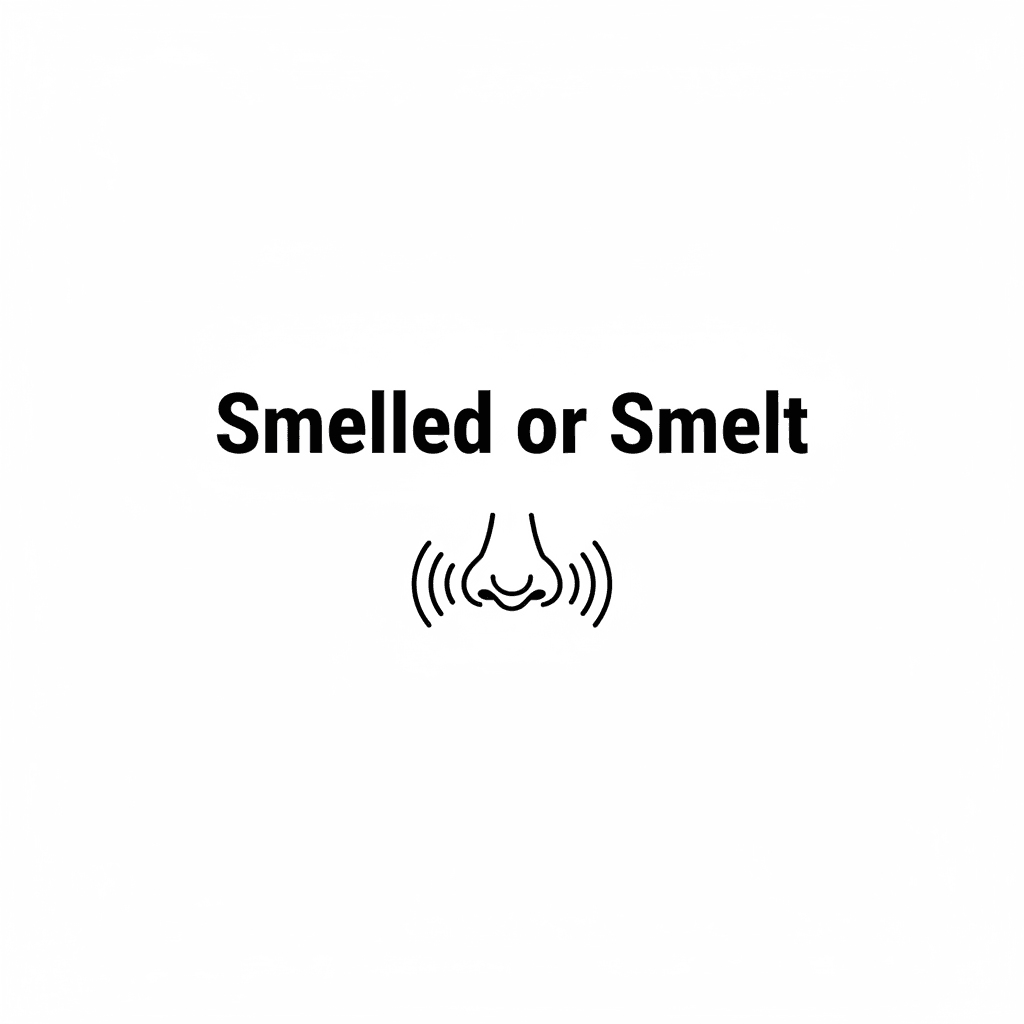Smelled vs. Smelt: Which One Is Correct?
 Both smelled and smelt are past forms of the verb smell.
Both smelled and smelt are past forms of the verb smell.
They mean the same thing — but the difference depends on where you live.
Smelled → standard in American English Smelt → common in British English
Both are correct, but one may sound more natural based on the region.
1. Smelled
Meaning
Smelled is the regular past tense and past participle of smell.
It is the preferred form in American English.
Examples (10 total)
- I smelled something delicious in the kitchen.
- She smelled the flowers before buying them.
- The room smelled clean after the renovation.
- He smelled smoke and called the fire department.
- The dog smelled food and ran over.
- They smelled the fresh ocean air.
- She smelled perfume on her sweater.
- He smelled gasoline near the garage.
- The kids smelled cookies baking in the oven.
- I smelled rain in the air.
🧠 Tip:
If your audience is American → use smelled.
2. Smelt
Meaning
Smelt is also a correct past tense and past participle, but it is used mostly in British English, Australian English, and New Zealand English.
It has two meanings:
- The past tense of smell (British)
- A completely different verb: to extract metal from ore
This article focuses on meaning #1.
Examples (10 total – smell meaning only)
- She smelt fresh bread as she walked past the bakery.
- The garden smelt wonderful after the rain.
- He smelt smoke and went outside to check.
- The kitchen smelt like spices and herbs.
- The room smelt nicer after cleaning.
- My hands smelt like soap all morning.
- The flowers smelt sweet and gentle.
- His jacket smelt like the campfire.
- The air smelt cold and crisp.
- The house smelt familiar and comforting.
🧠 Tip:
If your readers are British → smelt may feel more natural.
3. Quick Comparison Table
| Feature | Smelled | Smelt |
|---|---|---|
| Meaning | past tense of smell | same meaning (British) |
| Region | American English | British/Commonwealth English |
| Type | regular form | irregular variant |
| Example | I smelled smoke. | I smelt smoke. |
4. How to Remember
👉 If writing for a U.S. audience → smelled
👉 If writing for a U.K. audience → smelt
Memory trick:
Smelled is longer → like “America” (more letters).
Smelt is shorter → like “U.K.” (fewer letters).
5. Common Mistakes
❌ Thinking one form is incorrect
✔ Both are correct depending on the region
❌ Mixing “smelt” (British past tense) with “smelt” (metal processing)
✔ Context shows which meaning applies
❌ Using both forms in the same text inconsistently
✔ Choose one based on your writing style
Making Your Writing Sound Smooth
Choosing between smelled and smelt can affect the tone of your writing, especially when your audience expects American or British usage. If you're unsure which version reads more naturally, an AI humanizer can rewrite sentences to match the tone, region, and style you want — making your text feel consistent and truly human.
FAQs
1. Is “smelled” American or British?
Smelled is American English.
2. Is “smelt” wrong in the U.S.?
Not wrong, but it sounds uncommon or old-fashioned.
3. Is “smelt” still used in the U.K.?
Yes, both smelled and smelt are used, but smelt is more traditional.
4. Are the meanings different?
No — both mean the past tense of smell.
Practice: Choose the Correct Word (“Smelled” or “Smelt”)
(Answers are at the end.)
- She __________ fresh coffee in the morning.
- The air __________ like rain before the storm.
- He __________ something burning in the kitchen.
- The flowers __________ amazing after watering.
- I __________ perfume when I entered the room.
- His clothes __________ like smoke after camping.
- The basement __________ strange yesterday.
- They __________ fresh paint as they walked by.
- My hands __________ like soap.
- The dog __________ food and ran over.
Answers
- smelled / smelt
- smelled / smelt
- smelled / smelt
- smelled / smelt
- smelled / smelt
- smelled / smelt
- smelled / smelt
- smelled / smelt
- smelled / smelt
- smelled / smelt
